
foreword | Historical Narratives | Resources | Links | Contact
MALIGNING MONTCALM
History is shot through with passion.
 |
Montcalm was only one of the cast of three important characters in Quebec. Although subordinate to Governor General Marquis de Vaudreuil, Montcalm had nothing but contempt for the governor, the Canadians, the Natives and the Canadian way of war. To him the Canadians were an undisciplined rabble of little or no military value, who had an inflated opinion of themselves. Montcalm and his officers did not hide their prejudices nor conceal their criticism of Vaudreuil's strategy and method of making war. "The Canadian concept of war is going on raids that resemble hunting parties." Montcalm regularly complained of "petty means" and "petty ideas." The divergence of ideas and differing views on strategy were worsened by the petty jealousy over authority and their desire for recognition and reward.
By virtue of necessity, Vaudreuil had to depend on what was known as, petite guerre, a French expression that means, "little war." Comparable to gGuerrilla warfare, it represents combat by a military force weaker than an army it is pitted against. The term generally refers to a civilian population that takes up arms against an invader. Petite guerre also refers to "all the movements that merely back up the operations of an army." It involves commandos or special forces. Historically, petite guerre referred to regular, light troops which harassed the enemy, gathered intelligence and carried out deep strikes. Organized into small groups called "parties," they terrorized the enemy's rear. Petite Guerre (capitalized) refers to the irregular warfare used by the North American Aboriginals, that subsequently was adopted by the Canadians, In 1713, the Canadian population was 18,119; in 1754, it was 55,009. New England had 60,000 men available to take up arms, while Canada had 4484 militiamen. Because of their smaller population, Canadians had to adopt military methods that made the most of limited resources.
Montcalm's contempt for such forces and for Canadian officials who shared leadership positions in Quebec was returned in full measure. Like Wolfe, Montcalm was similarly insulted and persistently belittled by his Canadian colleagues. His most malicious detractor was Vaudreuil. During the years 1755 to 1760, he was as governor responsible for all military matters, relations with the Aboriginals and the supervision of all other officials. Montcalm, a small, lively, impetuous, imprudent individual was vehement in utterance, but could also be generous and open in character. Vaudreuil on the other hand while ostensibly gracious, was underhanded and preferred behind the scene speculation and intrigue. The French government, which failed to prescribe more clearly, the relationship between the governor and the general, contributed to their conflict at a time of crisis in the colony, when no more contentious characters could have come together.
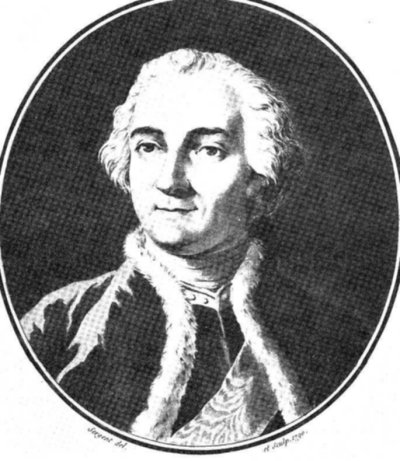 |
|
Montcalm |
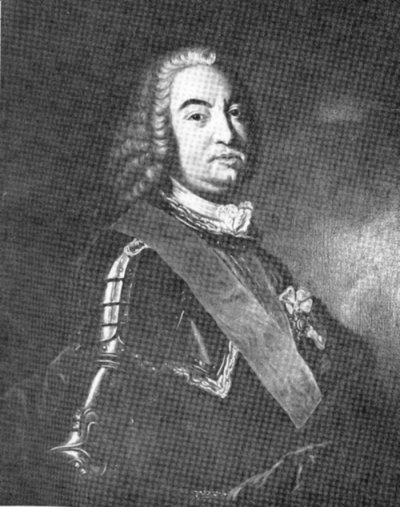 |
|
Vaudreuil |
Vaudreuil was a native of New France. He was a tall man who was as proud of his stature as his origin. He was enthusiastic, irresolute and intensely jealous of his authority and seemingly incapable of controlling the corrupt entourage which proliferated around him. Pleasant and pleasing when it served his purpose, Vaudreuil was also intensely vain and egotistical with a ballooning ambition. He was insanely jealous of anyone who rivalled him for the affection of King Louis XV. Vaudreuil detested Montcalm but was no match for the quick-tempered, tempestuous general who tactlessly aggravated their relationship by expressing harsh opinions and contempt for all colonials. From the moment he arrived in New France Montcalm was almost as much at odds with the locals as he was at war with the British.
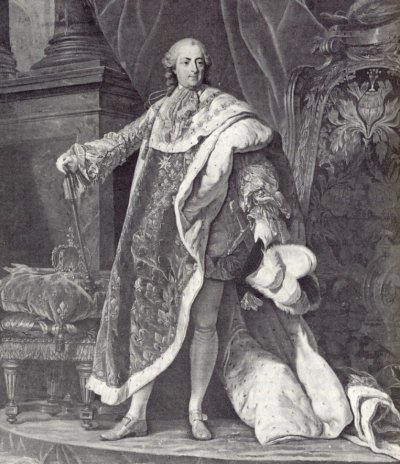 |
|
Louis XV |
At a time of supreme crisis for France in North America, the brilliance of Montcalm as military leader was squandered by the parsimony of the French court, the vast embezzlement of Quebec officials and the egotism and vanity of Vaudreuil who lost no opportunity to frustrate the plans of Montcalm. In dispatches to France both men endeavoured to enhance their own importance by exaggerating their actions and achievements while belittling in every way the work and worth of the other. "I am confident," wrote Vaudreuil, "that I shall reduce the fort at Oswego if Monsieur de Montcalm follows the directions I gave him."
Initially Montcalm's leadership was faultless. His first victory over the British came at Fort Oswego which capitulated after a brief siege in August 1756. Victories followed at Fort William Henry in 1757 and Fort Carillon [Ticonderoga] in 1758. Following his triumph at Ticonderoga, Montcalm wrote to his mother: "Never was general in a more critical position thatn I was. God had delivered me; his be the praise. He gives me health, though I am worn out with labour, fatigue, and miserable dissensions that have determined me to ask for my recall. Heaven grant that I may get it."
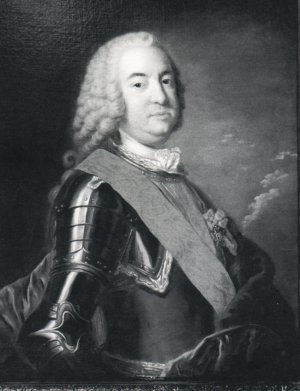 |
|
Marquis de Rigaud de Vaudreuil |
Vaudreuil was envious of Montcalm's victory particularly because it was won by troops of the line without aid from Indians and little Canadian involvement. When news of Montcalm's victory at Oswego reached him, Vaudreuil was quick to claim credit.
In His Own Words
"The measures I took assured our victory in spite of opposition. The hopes of His Britannic Majesty have vanished and will hardly revive again for I shall take care to crush them in the bud." French authorities appeared to encourage this disparaging deception by assigning to Montcalm a special cipher and a private address so that he could criticize his superior whenever and however he chose. Needless to say the bitterness that developed between the two men seriously impaired their working relationship.
Vaudreuil preferred North American-style warfare which sought out and destroyed enemy forces using guerrilla tactics. His strategy was to safeguard Montreal and Quebec City by extending defensive lines "contesting the ground on our frontiers inch by ince with the enemy." By doing so he was protecting the widely scattered frontiers of New France. Using hit and run raids with small detachments of Canadian and Native fighters, he forced the British to maintain large defensive forces on their frontiers. Vaudreuil also used these small outlying bases to maintain important alliances with the Aboriginal tribes.
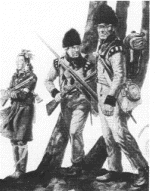 |
|
Hit & Run Raids |
Canadian militiamen took the fight to enemy forces by pursuing and flushing them out. They dodged and darted about using whatever cover was available, believing a moving target was more likely to survive to fight again. Unlike soldiers on the continent steeped in convention and tradition, they were not prepared to stand and be shot at while awaiting an officer's order to return fire.
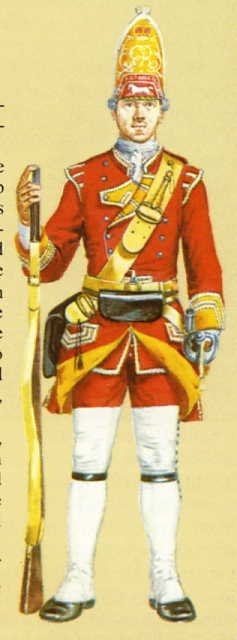 |
|
British Infantryman |
Montcalm was new to warfare in the wilderness where practicality ranked above precedent. In the colony dress and discipline were looser and raids and ambushes took the place of pitched battles. It might have been the practice in Europe to send soldiers in serried ranks marching through the countryside with flags flying and bands playing, but in the trackless wilderness of North America it was lunacy, particularly after the Aborigines had adapted to the use of gunfire. Concealment, harassment, ambush and scattering were the new watchwords. European forces fighting in Canada regularly blundered into disaster because their leaders failed to recognize the Canadians' and the Aborigines' greater experience in forest fighting.
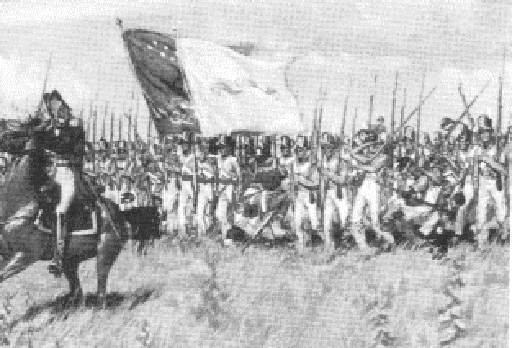 |
|
Serried Ranks |
Montcalm was contemptuous of colonial soldiers and their preference to fight and then flee. He and the French regulars considered these tactics shameful and cowardly. They preferred to remain where they were and force the enemy to come and confront them. Montcalm favoured European-style tactics with sieges and set-piece battles in which army units stood in formation on a field of battle firing massed volleys when ordered to do so.
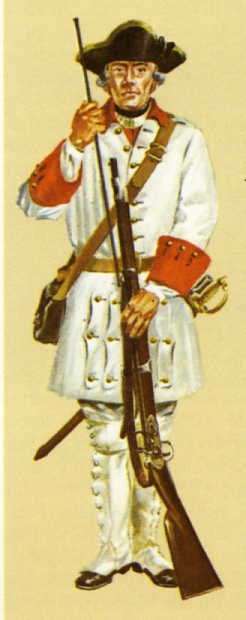 |
|
French Infantryman |
He believed that the superior training and discipline of the French troops would bring victory under his leadership. While he was a skilled commander, Montcalm failed completely to understand and appreciate the fundamental differences in attitude and approach between the regulars and the militia.
Montcalm also favoured focussing all his military might on the defence of the heart of the colony and to do so he advocated withdrawing French forces from the outlying locations and concentrating them around Quebec. This strategy betrayed Montcalm's weakness as a commander who was not offensively-minded and failed to seize the initiative when the opportunity presented itself. He preferred to react to the enemy's moves rather than act and force the foe to react to him.
As casualties cut into the ranks of the regulars and few replacements were forthcoming from France, Montcalm was forced to press members of the Canadian militia into his battalions to keep them at full strength. The type of set-piece battles Montcalm preferred to fight required at least eighteen months of training on the drill ground before civilians could be converted into soldiers capable of manoeuvring en masse. This required recruits who were prepared to march up to the enemy, fire in volleys on command and then stand fast in the face of the enemy's return volleys or bayonet charge. Canadians were simply not prepared to accept this method of battlefield manoeuvre.
This military muddle was greatly aggravated by the mutual dislike between French regulars and Canadian militiamen. "The troops from France," wrote Vaudreuil, "are not on good terms with our Canadians. Their officers threaten the Canadians with sticks and swords and oblige them to carry these gentry on their shoulders through cold water over rocks that cut their feet. Montcalm is so quick tempered he goes to the length of striking the Canadians. How can he restrain his officers if he cannot restrain himself."
Montcalm's felt nothing but contempt for the militia. "I have used them with good effect but not in places exposed to enemy fire. They know neither discipline nor subordination and think of themselves in all respects as the first nation on earth." Montcalm called Vaudreuil "a timid man who can neither make a resolution nor keep one. When he produces an idea he falls in love with it as Pygmalion did with his statue. I can forgive Pygmalion, for what he produced was a masterpiece."
Their differing military strategies and tactics caused Montcalm and Vaudreuil to clash frequently. The divided command, their shared aversion to each other and their conflicting defensive policies completely undermined attempts to defend New France. The French general versus the Canadien governor was a wasteful personality clash that as much as anything cost France its colonies.
The third member of New France's gang of three was Francois Bigot, the sinister intendant who cared more about loot than loyality. More than any other man in the colony, "he marshalled and organized the forces of knavery." While lower in status than the governor-general, the intendant was a key person in the colony who was responsible for civil administration, justice, law and order and the colony's finances. Bigot was clever, energetic, skillful in business and a gracious host, but completely corrupt and so plundered New France that he was a critical factor in its fall.
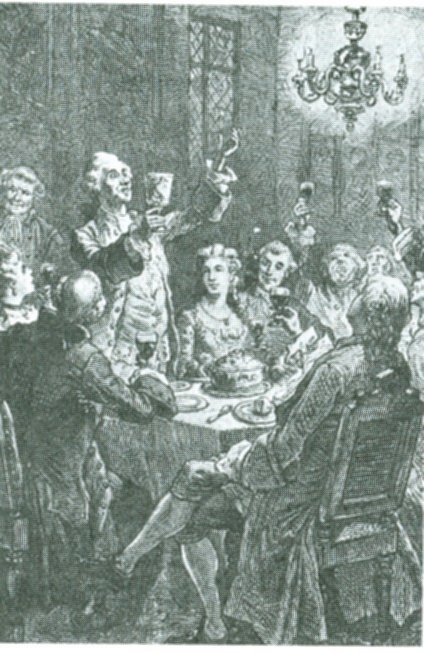 |
|
Despite the Bombardment Bigot's Debauchery Continued |
Bigot used his office to amass great wealth. The unscrupulous intendant developed a system whereby every branch of the pubic service paid him a fee, a scheme which made him wealthy and very powerful. With a stroke of his pen he could and did enrich his many cronies, a practice that eventually brought chaos to the colony. Bigot was preying on Quebec's vital resources and weakening her in a military sense quite as much from inside as the British navy was from without.
 |
Nothing in the history of New France is sadder than its serving as the prey of official jackals. The tragic tale of corruption was a sure sign that bonds between France and its colony ceased to have any warmth of sentiment or moral validity. Recklessness is often closely related to despair and Bigot's accomplices, the whole vampire brood, flocked around the prey more greedily than ever when they saw that the British conquest might take it out of their clutches. As doom drew nearer the fraud, deceit and deception increased. Bigot and his henchmen hoped catastrophe in the colony would cover the contagion that resulted in great depredations.
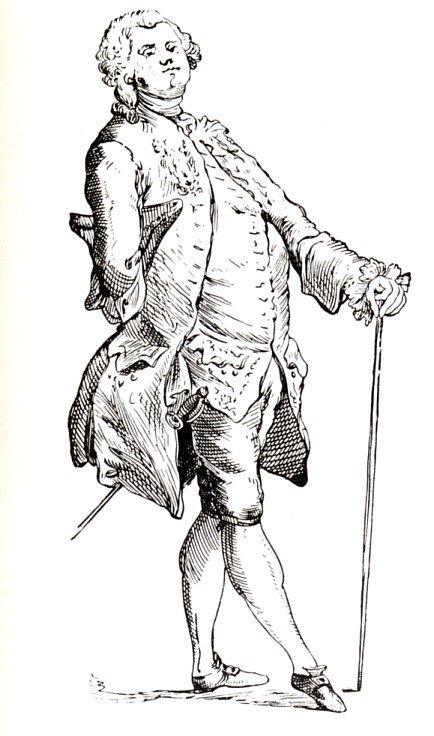 |
|
Bigot, the Predatory Intendant |
The powers of the colonial officials overlapped intentionally for the Supreme Council in France wanted to prevent any one individual in the colony from becoming too powerful. The result was discord, dishonesty corruption in the colony's administration. Montcalm regularly raged over the unscrupulousness that bedevilled the colony and its people who had no voice in their own destiny.
In His Own Words
"What a country, what a country, where knaves grow rich and honest men are ruined."
In 1759 in a letter written in cipher to the Minister of War, Montcalm stated, "I have often spoken of the (excessive and questionable) expenditures of M. de Vaudreuil and M. Bigot and each throws the blame on the other".
Montcalm yearned for his wife, his ten children and his estate at Candiac with its olive groves. He was numb with grief at the vague news that one his daughters had died and never lived to learn which of his treasured children he had lost. He was frustrated by the French government's unwillingness to furnish fresh troops and much-needed resources. France's failure to provide New France with a steady flow of supplies and reinforcements resulted in the garrison at Quebec becoming dejected, discontented and discouraged. Pessimistic reports regarding New France's chances of surviving an all-out British attack began to filter back to France and ironically these negative reports, instead of motivating action served only to reinforce France's reluctance to finance what they grew to believe was a losing venture.
Despite previous French successes in the field, France's leaders adopted a defeatist attitude, and outlook regarding their North American colony. This resulted in the King's council believing it would be folly to commit large funding and forces in support of a forlorn hope. As a result no serious attempt was made to reinforce Quebec and it was quietly written out of France's grand strategy. Military resources were needed in Europe and to defend the valuable sugar islands of Guadeloupe and Martinique. New France must make do with what it had. In response to pleas from Montcalm for men and money, the French colonial minister replied, "Eh, monsieur, when the house is on fire one cannot occupy one's self with the stable."
Meanwhile in spite of its earlier losses, Britain was determined to prevail and lavished men and money on its colonial military. "From all sides, dear brothers," observed a Canadian militia officer, "the enemy is making immense preparations, its forces at least six times greater than ours." While the French king offered little in the way of men and materials, he was more than generous with medals, medallions and promotions. He played off the three paladins against each other by cynically promoting his military leaders, believing they would be bound all the more to him as the one who bestowed such gifts.
Montcalm's request for recall was refused because he was considered indispensable. He was raised to the rank of lieutenant-general and promised the coveted honour "cordon bleu" if he saved the colony. In a secret dispatch dated January 28th, 1759, the King informed Montcalm that in the event of Vaudreuil's death Montcalm would become governor-general of Canada. Vaudreuil too was awarded a prestigious decoration. The king hoped to keep his officials content with honours that cost the court nothing. Despite the shortage of men and materiels Montcalm was advised that "the court wishes you not to capitulate. Keep a foothold in Canada at whatever cost."
 |
Vaudreuil's letter on the eve of the attack was equally characteristic. As soon as he heard the English had arrived, he informed the Minister in France that he intended to march to Montreal to give battle "and I shall do so again and again till I have forced him to retire or until he has entirely crushed me by excessive superiority of numbers." There was no word about deferring to or even collaborating with Montcalm in their joint tasks of defending the citadel of Canada.
Montcalm saw the approaching tragedy of Canada and his own. "I am a general-in-chief, subordinated to the Governor. I am esteemed, respected, beloved, envied, hated. I appear proud, supple, stiff, yielding, polite, devout, gallant, etc. and I long for peace." The jaws of the English lion were about to close. "I think at the end of the next campaign, I shall ask bluntly, blindly for my recall because I am bored." There was to be for Montcalm no such safe, secure, easy way out. Plagued by a feuding trio and corruption from within while beset without by a watchful and wary enemy, French Canada's fate was sealed. On September 13th, 1759, doom descended.
 |
The drama of Quebec ended with the two principals dead. Vaudreuil along with Bigot and twenty other officials were tried in France for the loss of French possessions in North America. They were sent to the infamous French prison, Bastille, where they stayed for a year before being brought to trial for fraud. They spent another two years awaiting judgement. The trial in France into the loss of the empire in North America lasted 15 months. Vaudreuil put up a spirited defence. He maintained he was solely preoccupied with military matters and had nothing to do with finance. He said the sordid charges against him insulted his noble lineage and the honour of the armies of France. He wrapped himself in the mantle of Montcalm and appeared in court as a soldier of France, innocent and ignorant of the conniving and corruption that swirled about him. He was acquitted, awarded the Grand Cross of St. Louis and given a pension of 12,000 livres. He retired to his family chateau where he died at the age of 80 in 1778.
At the trial of Bigot his defence filled some 1000 pages. Despite this he was found guilty. The prosecutor demanded that he be made to kneel before the main gate wearing only a shirt, a rope around his neck and a placard labelling him "Thief." He was then to confess his crimes and have his head chopped off. The court decided instead to confiscate all his possessions, fine him 1,500,000 livres and banish him from France for life. He paid the fine and went to Switzerland where he "successfully fitted himself into local circles" and led a comfortable life before dying on January 12th, 1778.
Tragically wrote one historian, there was enough ability among them to have saved New France from ruin. Torn from without by invasion and from within by pillage and dissension, there was no way the colony could survice.
Copyright © 2013 Website Administrator